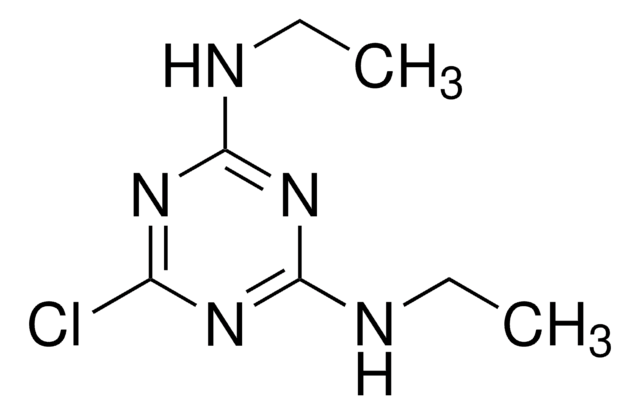40662
Simazine
certified reference material, TraceCERT®, Manufactured by: Sigma-Aldrich Production GmbH, Switzerland
Synonym(s):
2,4-Bis(ethylamino)-6-chloro-1,3,5-triazine
About This Item
Recommended Products
grade
certified reference material
TraceCERT®
Quality Level
product line
TraceCERT®
shelf life
limited shelf life, expiry date on the label
manufacturer/tradename
Manufactured by: Sigma-Aldrich Production GmbH, Switzerland
storage temp.
2-8°C
SMILES string
CCNc1nc(Cl)nc(NCC)n1
InChI
1S/C7H12ClN5/c1-3-9-6-11-5(8)12-7(13-6)10-4-2/h3-4H2,1-2H3,(H2,9,10,11,12,13)
InChI key
ODCWYMIRDDJXKW-UHFFFAOYSA-N
Looking for similar products? Visit Product Comparison Guide
General description
Certified content by quantitative NMR incl. uncertainty and expiry date are given on the certificate.
Download your certificate at: http://www.sigma aldrich.com
Simazine is 1,3,5-triazine herbicide, absorbed mainly through roots. Systemic and selective in nature, it binds to the QB site on the D1 protein of the photosystem II complex, disrupting photosynthetic electron transport. Simazine is used for pre-emergence control of annual grass and broad-leaved weeds in pome fruit, stone fruit, bush and cane fruit, citrus, vines, strawberries, nuts, olives, pineapples, field beans, French beans, peas, maize, sweet corn, asparagus, hops, alfalfa, lupins, oilseed rape, artichokes, sugar cane, cocoa, coffee, rubber, oil palms, tea, turf, and ornamentals.
According to the Commission Implementing Regulation (EU) No 2004/247/EC of 10th March 2004, simazine is not approved for use in the European Union (EU) as a plant protection agent, following Regulation (EC) No. 1107/2009. But maximum residue levels of 0.01 mg/kg to 0.25 mg/kg are allowed for the presence of simazine in products of plant and animal origin, according to the EU Reg. No 310/2011.
Application
Simazine CRM may also be used as given below:
- Development and validation of an ultrasonic-assisted dispersive liquid-liquid microextraction (UA-DLLME) method for sample extraction, followed by gas chromatography-mass spectrometry based determination of endocrine-disrupting herbicides in the river and seawater samples
- Determination of triazine pesticide residues in samples of apples, pears, carrots, potatoes, tomatoes, avocado, cucumber, spinach, bananas, and oranges by modified QuEChERS and solid-phase extraction (SPE) procedures, followed by liquid chromatography-photodiode array (LC-DAD) analysis
- Multi-residue analysis of 67 pesticides in olive oil, olives, and avocado samples by liquid chromatography-tandem mass spectrometry (LC-MS/MS) to evaluate various clean-up sorbents
- Quantitation of 20 pesticides in eel and shrimp samples by a scheduled multiple reaction monitoring (sMRM) method and QuEChERS with EDTA for sample extraction and purification
- Analysis of 35 micropollutants including pesticides in water samples by liquid chromatography-tandem mass spectrometry (LC-MS/MS) after their solid-phase extraction
- Simultaneous quantification of 58 pharmaceuticals and personal care products (PPCPs) and pesticides in water samples by solvent-based de-emulsification dispersive liquid-liquid microextraction (SD-DLLME) combined with liquid chromatography-tandem mass spectrometry (LCMS/MS)
Recommended products
Legal Information
Signal Word
Warning
Hazard Statements
Precautionary Statements
Hazard Classifications
Aquatic Acute 1 - Aquatic Chronic 1 - Carc. 2
Storage Class Code
11 - Combustible Solids
WGK
WGK 3
Flash Point(F)
212.0 °F - closed cup
Flash Point(C)
100 °C - closed cup
Choose from one of the most recent versions:
Certificates of Analysis (COA)
Don't see the Right Version?
If you require a particular version, you can look up a specific certificate by the Lot or Batch number.
Already Own This Product?
Find documentation for the products that you have recently purchased in the Document Library.
Our team of scientists has experience in all areas of research including Life Science, Material Science, Chemical Synthesis, Chromatography, Analytical and many others.
Contact Technical Service







